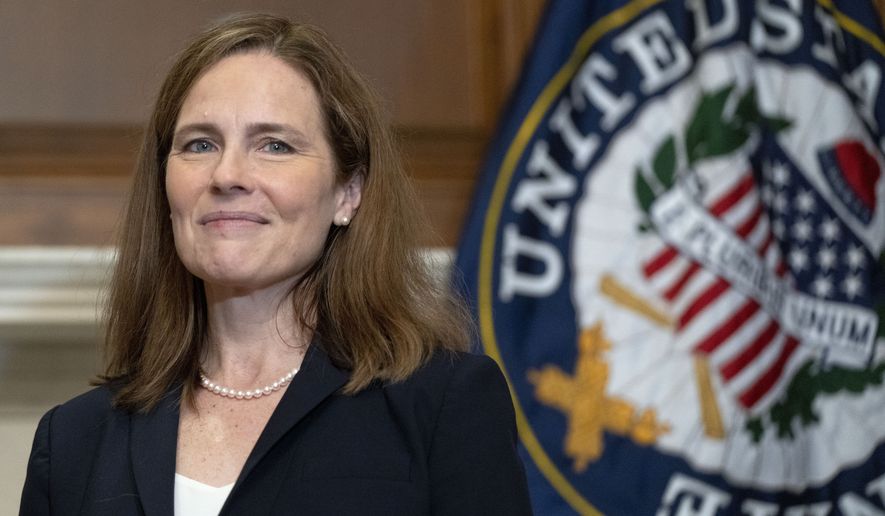A newly sworn-in Supreme Court Justice Amy Coney Barrett would plunge this week into election-related legal battles from swing states.
These are precisely the types of cases that her critics say she is being sent to the bench in a hurry to hear as a Trump ally on the bench, which will test her resolve under the intense scrutiny of the Washington political class.
Democrats quizzed the nominee during her confirmation hearings about whether she will recuse herself from election challenges, as the high court braces for a record number of disputes in the presidential election.
First up are lawsuits out of North Carolina, Wisconsin and Pennsylvania. The high court will have to decide whether the states can extend the time for counting mail-in ballots roughly one week after Election Day, possibly leaving the outcome of the Nov. 3 election.
Democrats have argued more time is needed due to an allegedly slower postal system during the pandemic.
“We will see if she will recuse herself from election cases. I don’t think she will. The arguments for recusal are very weak,” said Josh Blackman, a professor at South Texas College of Law.
Judge Barrett could also have to deal with appeals related to COVID-19 restrictions. Businesses, churches, and individuals have filed suits challenging the strict shutdowns in several states.
But when it comes to cases already granted review by the justices and scheduled for oral argument in November, all eyes will be on how Judge Barrett handles oral arguments on Nov. 10 over the fate of the Affordable Care Act.
Now that the 2017 GOP tax cuts eliminated the tax penalty for the individual mandate at the heart of the law, the high court must decide whether the rest of Obamacare can still stand.
Democrats have claimed Judge Barrett will vote to strike down the ACA because she previously expressed criticism over Chief Justice John G. Roberts Jr. upholding the law in 2012 as a tax.
During her confirmation hearings, though, Judge Barrett noted she made that criticism as a law professor at the University of Notre Dame and that the legal issue in the Nov. 10 case is different from the 2012 ruling.
President Trump has made comments about how he hopes his high court appointments will rule on the health care challenge, as he and the Republican Party have long wanted to undo President Obama’s signature health care law.
Democratic senators on the Judiciary Committee tried to suggest Mr. Trump’s comments about striking down Obamacare taint Judge Barrett’s ability to fairly handle the case.
Like in the election disputes, Democrats have called for her to recuse herself from taking part in the Obamacare case.
Much suspense will surround her recusal decision.
Due to the social distancing effort for the coronavirus pandemic, oral arguments are being held via teleconference. The setup will delay for about an hour before court watchers know whether a newly minted Justice Barrett is present for the arguments. As the newest justice, her time to question the lawyers will come last.
The justices have been taking turns quizzing the lawyers one at a time.
“It is sort of dramatic,” Mr. Blackman said.
Ilya Shapiro, the publisher of the Cato Institute’s Supreme Court Review, thinks the claims that the whole health care law will be struck down by the high court seem unlikely and are overblown.
“I don’t think there is even one vote to invalidate the ACA,” he told The Washington Times.
Before all eyes are on the future of Obamacare, the new justice will be in the spotlight for how she handles a religious liberty challenge on Nov. 4 — the day after the election.
In Fulton v. City of Philadelphia, Catholic Social Services has sued the City of Philadelphia for banning the Christian organization for not placing children in foster homes with same-sex couples.
During confirmation hearings for both her 7th U.S. Circuit Court of Appeals nomination in 2017 and subsequently the high court nomination, Judge Barrett was peppered with inquiries about her Catholic faith, as she has identified as a devout Catholic.
“Given all the discussion about her religion, that will probably be one that people will be focused on,” said Curt Levey, president of the Committee for Justice.
• Alex Swoyer can be reached at aswoyer@washingtontimes.com.




Please read our comment policy before commenting.